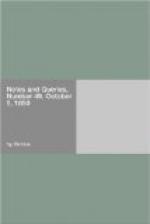The great fault of antiquarians is, that they are constantly beginning at the wrong end: they fix on some one piece of information that they want to get, and devote a world of labour to hunting about in all directions for anything bearing on the subject; whereas the rational way obviously is, to have the whole existing mass of (valuable) knowledge classified, and then the inquirer would know where to look for his purpose.
Of course there will always remain much knowledge of a miscellaneous and irregular nature which is picked up by accident, and does not come within the scope of the present design; but this is generally of a trifling and fugitive kind, and does not at all controvert the principle above laid down.
In conclusion, I have worked out a tolerably complete series of arrangements for the above design, showing its practicability as well as usefulness, which will be much at the service of any one who can use them for the furtherance of that object.
W. D.
* * * * *
MINOR NOTES.
Numerals.—For the old Indian forms, see Prinsep’s Journal Asiatic Soc. Bengal, 1838, p. 348. The prospectus of Brugsh, Numerorum apud Egyptios Demoticorum Doctrina, Berlin, promises to give from papyri and inscriptions not only the figures, but the forms of operation. Probably the system assumed its present form by the meeting of the Indian and Egyptian traders at some emporium near the mouth of the Indus. Peacock seems to give undue weight to the fact, that the Tibetans have a copious nomenclature for high numbers: their arithmetic, doubtless, came with their alphabet, and the Buddhist legends from India.
F.Q.
Junnius and Sir Philip Francis.—A few years ago, an aged intelligent person named Garner was living at Belgrave, near Leicester. I have heard him say that, when he was a farm bailiff to Lord Thanet, at Sevenoaks, in Kent, Sir Philip Francis was a frequent visitor there, and had a private room set apart for literary occupation. On one occasion, when he (Mr. Garner) was riding over the farm with Sir Philip Francis, the former alluded to one of the replies to Junius, by a clergyman who had been the subject of the “Great Unknown’s” anonymous attacks, adding, “They say, Sir Philip, you are Junius.” Sir Philip did not deny that he was the man, but simply smiled at the remark. This, and other circumstances coupled with the fact of Sir Philip’s frequent visits to the house of so noted a politician as Lord Thanet, rendered Mr. Garner a firm believer in the identity of Sir Philip and Junius to the end of his days.
JAYTEE.
Jews under the Commonwealth (Vol. i., pp. 401. 474.; vol ii., p. 25.).—There is a confirmation of the story of the Jews being in treaty for St. Paul’s and the Oxford Library in a passage in Carte’s Letters, i. 276, April 2, 1649:—




